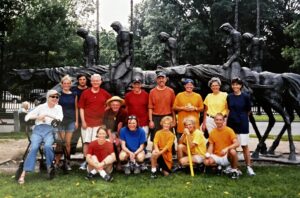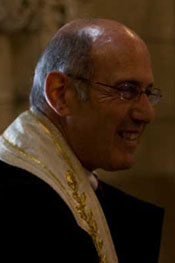The Third Sunday of Advent, 3B, December 14, 2014; The Rev. Pamela L. Werntz
Isaiah 66:1-4, 8-11. To give them a garland instead of ashes.
1 Thessalonians 5:16-24. Rejoice always, pray without ceasing.
John 1:6-8, 19-28. This took place in Bethany across the Jordan where John was baptizing.
O God of hope, may we have the wisdom, the strength, and the courage to seek always and everywhere after truth – come when it may and cost what it will.
One of the benefits of sharing sanctuary and programs, families and friendships, with a synagogue is that we are regularly called out of theological complacency when it comes to our Christian scripture and Church tradition’s references to Jews – or Levites, priests from Jerusalem, high priests, Sadducees, scribes, or Pharisees. I changed the word Jews in our Gospel lesson to Judeans by way of putting a speed bump in our path, not because Judeans is necessarily the best translation of Judaios here, but because I want us all to slow down a little bit when we listen to this reading. John the Evangelist (that is, John, the Gospel writer) begins his version of the story of Jesus with tension between “the Jews” and Jesus in a way that the other three Gospel writers do not. For John the Evangelist, the tension started before Jesus even appeared on the scene. It’s not exactly clear to scholars who John means when he writes Judaios. He’s certainly not talking about all Jews or all Judeans even at the time, since Jesus and his followers were all Jewish. He may be contrasting Judeans and Galileans, but most likely he’s writing about some of Jerusalem’s religious authorities.[1] He clearly has an ax to grind that the other Gospel writers do not have. The Gospel of John uses the term Judaios some sixty-four times compared with six in the Gospel of Mark, five in Matthew, and three in Luke.[2] It seems that John, who was writing in the late first century, is caught up in a late-first-century conflict, which he is applying retroactively to the first part of the first century. I wonder if John is using the word the way some of us refer to “the police,” “the military,” or “the government,” when we are angry or despairing in the midst of struggle. I don’t know John’s intent, but I do know that we cannot let it slide. Continue reading →



